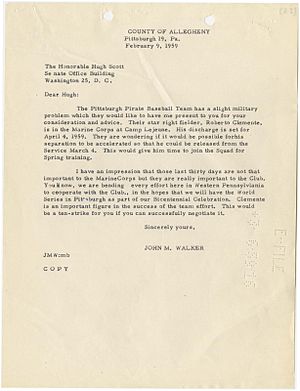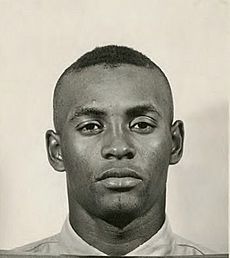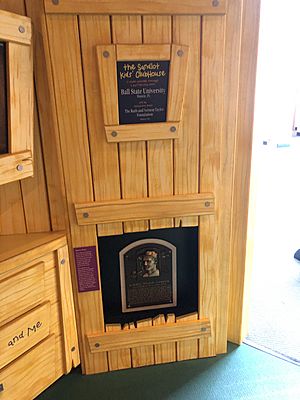Roberto Clemente facts for kids
Quick facts for kids Roberto Clemente |
|||
|---|---|---|---|
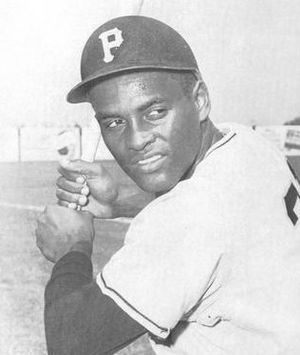
Clemente in 1965
|
|||
| Right fielder | |||
| Born: August 18, 1934 Barrio San Antón, Carolina, Puerto Rico |
|||
| Died: December 31, 1972 (aged 38) Isla Verde, Carolina, Puerto Rico |
|||
|
|||
| debut | |||
| April 17, 1955, for the Pittsburgh Pirates | |||
| Last appearance | |||
| October 3, 1972, for the Pittsburgh Pirates | |||
| MLB statistics | |||
| Batting average | .317 | ||
| Hits | 3,000 | ||
| Home runs | 240 | ||
| Runs batted in | 1,305 | ||
| Teams | |||
|
|||
| Career highlights and awards | |||
|
|||
| Induction | 1973 | ||
| Vote | 92.7% (first ballot) | ||
Roberto Enrique Clemente Walker ( August 18, 1934 – December 31, 1972) was a Puerto Rican professional baseball right fielder. He played 18 seasons in Major League Baseball (MLB) for the Pittsburgh Pirates. After his early death, he was posthumously inducted into the National Baseball Hall of Fame in 1973, becoming both the first Caribbean and the first Latin-American player to be inducted.
Contents
- Early life
- Puerto Rican baseball (1952–1954)
- Minor league baseball (1954)
- Major League Baseball: Pittsburgh Pirates (1955-1969)
- In the Army
- Pittsburgh Pirates, 1970s
- 3,000th career hit
- Charitable work and death
- Personal life
- Hall of Fame
- MLB awards and achievements
- Other honors and awards
- Interesting facts about Roberto Clemente
- Roberto Clemente quotes
- See also
Early life
Roberto was born in Barrio San Antón, Carolina, Puerto Rico, to Melchor Clemente and Luisa Walker. He was the youngest of seven children. During Clemente's childhood, his father worked as a foreman for sugar cane crops in the northeastern part of the island. Clemente and his brothers worked alongside his father in the fields, loading and unloading trucks. As a youth, Clemente was a track and field star and Olympic hopeful before deciding to turn his attention to baseball.
Clemente had first shown interest in baseball early in life. He often played against neighboring barrios.
He attended Julio Vizcarrondo Coronado High School in Carolina. During his first year in high school, he was recruited by Roberto Marín to play softball with the Sello Rojo team after he was seen playing baseball in barrio San Antón. He was with the team two years as a shortstop.
Clemente joined Puerto Rico's amateur league when he was 16 years old, playing for the Ferdinand Juncos team, which represented the municipality of Juncos.
Puerto Rican baseball (1952–1954)
Clemente's professional baseball career began at age 18 when he accepted a contract from Pedrín Zorilla with Cangrejeros de Santurce ("Crabbers"), a winter league team and franchise of the Puerto Rican Professional Baseball League (LBPPR). Clemente signed with the team on October 9, 1952. He was a bench player during his first season but was promoted to the Cangrejeros' starting lineup the following season. During this season he hit .288 as the team's leadoff hitter.
While Clemente was playing in the LBPPR, the Brooklyn Dodgers offered him a contract with one of the team's Triple-A affiliates.
Minor league baseball (1954)
After signing with the Dodgers on February 19, 1954, Clemente moved to Montreal to play with the Royals. Clemente received assistance from bilingual teammates such as infielder Chico Fernandez and pitchers Tommy Lasorda and Joe Black.
Black was the original target of the Pittsburgh Pirates' June 1, 1954, scouting trip to Richmond. Conducted by pitching coach Clyde Sukeforth, the mission's focus quickly shifted when he witnessed Clemente's throwing and batting prowess in pre-game drills.
The Pirates made Clemente the first selection of the Rule 5 draft that took place on November 22, 1954.
Major League Baseball: Pittsburgh Pirates (1955-1969)
Clemente debuted with the Pirates on April 17, 1955. For all but the first seven weeks of his major league career, Clemente wore number 21. He chose that number because his full name (Roberto Clemente Walker) had that many letters. For his first few weeks, Clemente wore the number 13, as his teammate Earl Smith was wearing number 21. It was later reassigned to Clemente.
Early in his career with the Pirates, he was frustrated by racial and ethnic tensions. Clemente was at a double disadvantage, as he was a Latin American and Caribbean player whose first language was Spanish and was of partially African descent. Clemente responded to this by saying "I don't believe in color." He said that, during his upbringing, he was taught never to discriminate against someone based on ethnicity.
The year before, the Pirates had hired Curt Roberts, their first African-American player. They were the fifth team in the NL and ninth in the major leagues to do so, seven years after Jackie Robinson joined the Dodgers. When Clemente arrived in Pittsburgh, Roberts befriended him and helped him adjust to life in the major league, as well as in the Pittsburgh area.
Clemente had to sit out several games, as he had suffered a lower back injury in Puerto Rico the previous winter. He finished his rookie season with a .255 batting average, despite trouble hitting certain types of pitches. His defensive skills were highlighted during this season.
Clemente was an All-Star every season he played in the 1960s. Only in 1968 he failed to hit above .300. He was a Gold Glove winner for each of his final 12 seasons, beginning in 1961.
He won the NL batting title four times: 1961, 1964, 1965, and 1967. He won the league's MVP Award in 1966.
In 1967, a plurality of major league GMs declared Clemente "the best player in baseball today."
In an effort to make him seem more American, sportswriters started calling him Bob or Bobby and his baseball cards even listed him as Bob Clemente. He disliked the practice and asked that it be stopped.
During the off-seasons (except the 1958–59, 1962–63, 1965–66, 1968–69, 1971–72, and 1972–73 seasons), Clemente played professionally for the Santurce Crabbers, Criollos de Caguas, and San Juan Senadores in the Puerto Rican baseball winter league, where he was considered a star. He sometimes managed the San Juan team.
In the Army
In September 1958, Clemente joined the United States Marine Corps Reserve. He served his six-month active duty commitment at Parris Island, South Carolina, Camp LeJeune in North Carolina, and Washington, D.C.
At Parris Island, Clemente received recruit training with Platoon 346 of the 3rd Recruit Battalion. The rigorous Marine Corps training programs helped Clemente physically; he added strength by gaining ten pounds and said his back troubles (caused by being in a 1954 auto accident) had disappeared. He was a private first class in the Marine Corps Reserve until September 1964.
Pittsburgh Pirates, 1970s
The 1970 season was the last one that the Pirates played at Forbes Field before moving to Three Rivers Stadium; for Clemente, abandoning this stadium was an emotional situation. The Pirates' final game at Forbes Field occurred on June 28, 1970. That day, Clemente said that it was hard to play in a different field, saying, "I spent half my life there." The night of July 24, 1970, was declared "Roberto Clemente Night"; on this day, several Puerto Rican fans traveled to Three Rivers Stadium and cheered Clemente while wearing traditional Puerto Rican attire. A ceremony to honor Clemente took place, during which he received a scroll with 300,000 signatures compiled in Puerto Rico, and several thousands of dollars were donated to charity work following Clemente's request.
During the 1970 season, Clemente compiled a .352 batting average; the Pirates won the NL East pennant but were subsequently eliminated by the Cincinnati Reds. During the offseason, Roberto Clemente experienced some tense situations while he was working as manager of the Senadores and when his father, Melchor Clemente, experienced medical problems and underwent surgery.
Following the conclusion of the 1971 season, he received the World Series Most Valuable Player Award.
3,000th career hit
 |
|
| Roberto Clemente's number 21 was retired by the Pittsburgh Pirates in 1973. |
Clemente played in 102 games and hit .312 during the 1972 season. He also made the annual NL All-Star roster for the twelfth time (he played in 14/15 All-Star games) and won his twelfth consecutive Gold Glove.
On September 30, he hit a double in the fourth inning off Jon Matlack of the New York Mets at Three Rivers Stadium for his 3,000th hit. It was his last regular season at-bat of his career.
His last game was October 11, 1972 at Cincinnati's Riverfront Stadium in the fifth and final game of the 1972 NLCS. He and Bill Mazeroski were the last Pirate players remaining from the 1960 World Series championship team.
Charitable work and death
Clemente spent much of his time during the off-season involved in charity work. When Managua, the capital city of Nicaragua, was affected by a massive earthquake on December 23, 1972, Clemente (who visited Managua three weeks before the quake) immediately arranged emergency relief flights.
He decided to accompany a relief flight. The airplane with Clemente on board crashed into the Atlantic Ocean off the coast of Isla Verde, Puerto Rico immediately after takeoff on December 31, 1972, due to engine failure.
A search and rescue effort was immediately launched. An empty flight case which apparently belonged to Clemente was the only personal item of his which was recovered from the plane. His body was never recovered.
At the time of his death, Clemente had established several records with the Pirates, including most triples in a game (three) and hits in two consecutive games (ten). He won 12 Gold Glove Awards and shares the record of most won among outfielders with Willie Mays.
Personal life
Clemente was married on November 14, 1964, to Vera Zabala at San Fernando Church in Carolina. The couple had three children: Roberto Jr., born in 1965, Luis Roberto, born in 1966, and Roberto Enrique, born in 1969. Vera Clemente died on November 16, 2019, aged 78.
Clemente was a devout Catholic.
In the 1958–59 off-season, Clemente enlisted in the United States Marine Corps, and served during off-seasons through 1964. He was inducted into the Marine Corps Sports Hall of Fame in 2003, and into the Puerto Rican Veterans Hall of Fame 15 years later.
Hall of Fame
On March 20, 1973, the Baseball Writers' Association of America held a special election for the Baseball Hall of Fame. They voted to waive the waiting period for Clemente, due to the circumstances of his death, and posthumously elected him for induction into the Hall of Fame, giving him 393 out of 420 available votes, for 92.7% of the vote.
Clemente's Hall of Fame plaque originally had his name as "Roberto Walker Clemente" instead of the proper Spanish format "Roberto Clemente Walker"; the plaque was recast in 2000 to correct the error. Both plaques are currently on display in the Hall of Fame, the new one in the plaque gallery and the original in the “sandlot kids clubhouse” area.
MLB awards and achievements
Awards
- NL MVP Award (1966)
- NL Player of the Month Award (May 1960, May 1967, July 1969)
- World Series MVP Award (1971)
- NL Gold Glove Award (1961–1972)
- Commissioner's Historic Achievement Award (2006)
Achievements
- NL All-Star (1960–1967, 1969–1972)
- NL leader in batting average (1961, 1964, 1965, 1967)
- NL leader in hits (1964, 1967)
- NL leader in triples (1969)
- NL leader in putouts as right fielder (1958, 1961, 1966)
- NL leader in fielding average as right fielder and outfielder (1972)
Other honors and awards
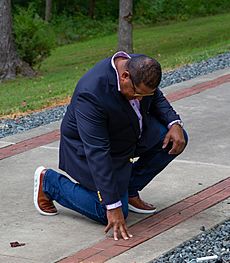
Following his death, Clemente received numerous awards, recognitions and homages. Dozens of schools, streets, bridges, public parks, buildings and sports venues have been named in his honor. Clemente is the athlete with most statues and monuments dedicated in the world, with more than a dozen in several countries.
In 2012, the Puerto Rico Professional Baseball League (LBPPR) was renamed Liga de Béisbol Profesional Roberto Clemente, the number 21 was also permanently retired. He had been inducted in several Hall of Fames for his performance on the field and also for his humanitarian as part of the World Sports Humanitarian Hall (1995). Clemente has been the subject of several documentaries, books and other media.
The government of Puerto Rico recognizes Clemente as a prócer (or national hero) and he has received the Congressional Gold Medal, Presidential Citizens Medal and Presidential Medal of Freedom from the federal government of the United States. An initiative to have him canonized by the Catholic Church took place during the 2010s.
In 2022, honoring 50 years since his passing, the MLB proclaimed September 15 as "Roberto Clemente Day".
Roberto Clemente Award
Since 1971, MLB has presented the Roberto Clemente Award (named the Commissioner's Award in 1971 and 1972) every year to a player with outstanding baseball playing skills who is personally involved in community work. A trophy and a donation check for a charity of the player's choice are presented annually at the World Series. A panel of three makes the final determination of the award recipient from an annual list of selected players.
Interesting facts about Roberto Clemente
- To induct Roberto Clemente, who died at a young age and had such a historic career, the Hall of Fame changed its rules of eligibility.
- Clemente was an All-Star for 13 seasons, selected to 15 All-Star Games.
- On July 25, 1956, in a 9–8 Pittsburgh win against the Chicago Cubs, Clemente hit the only walk-off inside-the-park grand slam in professional baseball history.
- He was the National League (NL) Most Valuable Player (MVP) in 1966, the NL batting leader in 1961, 1964, 1965, and 1967, and a Gold Glove Award winner for 12 consecutive seasons from 1961 through 1972.
- His batting average was over .300 for 13 seasons and he had 3,000 hits during his major league career.
- He also was a two-time World Series champion.
- Clemente was the first player from the Caribbean and Latin America to win a World Series as a starting position player (1960), to receive an NL MVP Award (1966), and to receive a World Series MVP Award (1971).
- Clemente was involved in charity work in Latin American and Caribbean countries during the off-seasons. He often delivered baseball equipment and food to those in need.
- MLB renamed its annual Commissioner's Award in his honor. Now known as the Roberto Clemente Award, it is given to the player who "best exemplifies the game of baseball, sportsmanship, community involvement and the individual's contribution to his team."
- After his death, the Pirates retired his uniform number 21.
Roberto Clemente quotes
- "A country without idols is nothing."
- "If you have a chance to accomplish something that will make things better for people coming behind you, and you don't do that, you are wasting your time on this earth."
- "I want to be remembered as a ballplayer who gave all he had to give."
- "I think all human beings are equal, but one has to unceasingly fight hard to maintain that equality."
- "When I was a boy, I realized what lovely people my mother and father were. I was treated real good. I learned the right way to live."
See also
 In Spanish: Roberto Clemente para niños
In Spanish: Roberto Clemente para niños


